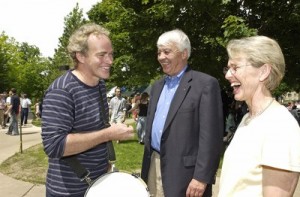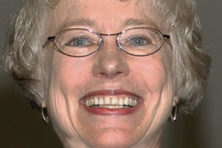In Memoriam: Richard ‘Rik’ Warch
- Share
- Tweet
- Pin
- Share

Rik (center) and his sister, Linda Fenton, share a laugh with Dane Richeson, director of percussion studies at Lawrence University.
When questioned about the unusual spelling of the diminutive he used for Richard, Rik Warch explained that his mother was fond of the short story “Rikki-Tikki-Tavi” in Kipling’s The Jungle Book, and he was thankful she hadn’t taken a shine to Tikki.
Humor was second nature to Warch. It was part of his brilliance. If you met him, you knew that. You can see it in photographs, where he and everyone around him are smiling, and you can see he is the source. And you can read it in his writing, which sparkles with lively and humane wit.
Rik Warch, the second-longest serving president of Lawrence University (1979-2004), died after a battle with cancer of the thymus on Saturday, Sept. 14, at his home in Ellison Bay. He was 74.
In the 2011 book A Matter of Style: Reflections on Liberal Education, Warch’s enlightened and enlightening matriculation convocation addresses that he delivered during his quarter-century term as Lawrence University’s 14th president are collected.
Warch begins the journey by telling the story of a Lawrence student nearing the end of his studies who admits that when he first came to the liberal arts college in downtown Appleton, Wis., he thought liberal arts meant he would be surrounded by Democrats.
Warch uses that as his starting point for explaining the true nature of a liberal arts college, which he believed transcended the curriculum and institution, “…the liberal arts college seeks not only to prepare students for lives of career and work, but also to equip them to develop as private persons and as public agents.”
In his first convocation as president of Lawrence in 1979, called Unamuno Begs to Differ, Warch invokes Spanish philosopher Miguel de Unamuno to examine Goethe’s dying words, which are imprinted on the Lawrence University seal: “Light, light, more light!”
Not more light, but more warmth, Unamuno says, for it is not the dark that kills but the cold.
Warch uses that to promote the idea of Lawrence students becoming enlightened and radiating that enlightenment in the larger world.
“The cry for more light, more intelligence, more knowledge is one that ought to earn our allegiance and devotion,” Warch wrote.
Warch was much more than a gifted advocate of a liberal arts education. He knew how to put advocacy into action. During his presidency, Warch oversaw two successful capital campaigns that raised $109 million between 1982 and 1997. Six new campus buildings were constructed and eight others received major renovations. Lawrence’s endowment grew from $23 million at the start of his presidency to more than $182 million when he retired.
Warch was instrumental in revising general education requirements at Lawrence and increasing the number of faculty in the conservatory of music, which significantly helped transform its scope.
Upon his retirement in 2004, Warch and his wife Margot moved to Door County, which was fitting since Warch had been a champion of an underused Door County property called Björklunden vid Sjön (Birch Forest by the Water) that was bequeathed to the university by an Illinois couple in 1963.
Until Warch’s presidency, the 325-acre estate just south of Baileys Harbor (now 425 acres) was basically a private hideaway for faculty and students in the know.
Warch saw the potential of Björklunden as Lawrence University’s northern campus, and so began an adult summer seminar series in 1980. When the original Björklunden lodge was destroyed by fire in 1993, Warch’s vision for the property was to transform it “from a seasonal asset to a year-round component of the college.”
While in hindsight, with the success of Björklunden as Northern LU with the many programs and concerts and sharing of space with Door Shakespeare, Warch’s vision may seem self-evident.
But his was a minority vision, and he had to win others over to see it his way.
“I think it’s safe to say that without his influence with the trustees and faculty, there’s a very good chance Lawrence University would have sold Björklunden,” said Mark Breseman, director of Björklunden. “He realized if Lawrence did give up Björklunden, never again would we have an opportunity to get a gift like that. It was a once in a lifetime gift to our college. He realized that it needed to involve students and faculty, make it part of the academic fabric of the college. And it would be a place that would last forever. When he made his suggestion to the trustees that students and faculty should be involved on a daily basis, they bought into that, with good reason.”
Breseman has served as director of Björklunden since 1997 but his roots there go much deeper.
“My personal association with Björklunden goes back to the summer of ’75,” he said. “I was a freshman at Lawrence and was lucky enough to be hired as the first student to work at Björklunden back in 1975.”
What is evident today is the success of Warch’s vision of Björklunden, and rebuilding the lodge to accommodate that vision, with rooms for seminars, lodging, gatherings.
“I would say it’s one of the standard bearers for Lawrence University. It’s certainly one of the things that sets Lawrence apart from any other liberal arts school in our area,” Breseman said.
He points out that 1,800 Lawrence students come up to Björklunden every year, but Lawrence only has 1,500 students.
“But it’s also used by faculty and staff. Athletics teams are up there all the time, student organizations,” Breseman said. “It also benefits the local community with seminars, concerts, a number of local nonprofits use it for meetings and fundraising galas. So I think Björklunden has made a huge imprint in the Door County lifestyle, and, again, it all goes back to Rik and his vision. He was a fabulous college president and a great friend. We also had a lot in common with Björklunden. We both grew up there, a little different generations, but it was a big part of both of our lives.
“When he retired to Door County, I was really excited about that because we did so many things together for Björklunden. He taught programs, he would give lectures, he would be part of volunteer cleanup days. He wouldn’t mind getting his hands dirty and do some work on the place. Also, I love the fact he was co-chair of the Björklunden advisory committee, guiding Björklunden and where it would go for the future. He had no problem keeping me on task – fundraising, programming, on down to the cleanliness of the lodge. His attention to detail was unparalleled.
“He was a treasure and I was very lucky to be able to claim him as a friend and colleague.”
Cynthia Johnson and her family knew the Warch family in Appleton.
“Our children went to the same elementary school,” she said. “He was just a towering presence in Appleton.”
Johnson, a retired Unitarian Universalist minister, moved to Door County with her husband Al in 2000, and began taking part in the Unitarian Universalist Fellowship of Door County, which is where she again became acquainted with the Warchs when they retired to Door County.
“I think that a really neat thing about his attending was that when he arrived, most people in the fellowship didn’t know he had been university president. I think that in all of those decades that he had such a high profile in Appleton and Bjorklunden and Lawrentian community, there were lots of people who didn’t know him. I think the fellowship was one of those places where he had a very normal life, where his leadership and reputation did not precede him. I remained a little bit intimidated by his brilliance. I loved the fact that he often came when I preached. People really liked it when he did the Sunday service. He was welcomed every place that he and Margot went in Door County.”
Johnson said she was at a Door County Land Trust event when she got the phone call about Warch’s death.
“The speed with which news of his death spread was a very Door County way, a village spreading news. Everybody needs to know.
So many people had heard and there just was a shocked, sad silence as people’s first reaction. That silence seems to me a tribute to him.”

